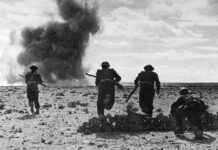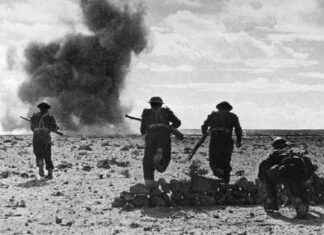“There are not many people of childbearing age left. The youngest have left to seek work in the big cities or abroad,” explains Ms. Kambourova, whose two sons have also left Gabrovo.
Bulgaria, the poorest country in the European Union, is depopulating at a rate almost unheard of in the world. In question, corruption, the absence of economic prospects and the succession of political crises – the Bulgarians voted at the beginning of October for their fourth legislative elections in a year and a half, which again led to a fragmented Parliament.
– “A desert” –
Nestled at the foot of the Balkan mountain range, the town of Gabrovo symbolizes this inexorable decline.
Cradle of the industry which earned it the nickname of Bulgarian Manchester at the beginning of the 20th century, it has only 48,000 inhabitants, almost half as many as in 1985.
Textiles, shoes, mechanical and chemical industry… thousands of workers were busy there under the communist regime, before the series of bankruptcies and wild privatizations.
“I arrived in 1985. At the time, the number of births was still high – around 1,000 per year”, says the 68-year-old doctor.
Last year, only 263 babies were born in her service which she runs energetically “for a pittance”.
At his side, a midwife continues: “The explanation is simple: no jobs, no young people, no babies”, sums up Mariana Varbanova.
And those who are still there have dreams of elsewhere.
“In Gabrovo, we appreciate the calm and the clean air, but it’s a desert where we only meet seniors,” says Hristiana Krasteva, a 23-year-old speech therapist who has just given birth to a little girl.
Moreover, her cabinetmaker husband is preparing to leave for England in search of a better future for his family.
– “Grandchild for rent” –
A high school student met in front of the building of the first public school in Bulgaria, founded in 1835, is in a hurry: to reach Western Europe in search of “quality education and new horizons”.
“It’s chaos here,” sighs Ivo Dimitrov, denouncing the negligence of the political class.
A glimmer of hope, Gabrovo has taken advantage of EU funds to launch territorial development projects, in transport or tourism. The municipality also seeks to develop the technological sector, but this sector needs little manpower.
“A reversal of the demographic trend will take time,” said Adrian Nikolov, expert at the Sofia think tank IME (Institute for Market Economics), interviewed by AFP.
The region holds the sad national record for the lowest birth rate and the number of villages without a living soul or with a single inhabitant: 163 are listed there, out of 5,000 municipalities in Bulgaria.
The country has lost a tenth of its population in a decade, according to the latest census: it stands at 6.52 million, the same as in 1934, against nearly 9 million in 1989. And a quarter are over 65 years old .
In the picturesque village of Zaya, located 25 km from Gabrovo, the 35 residents are all retired, in a nice mix of nationalities: French, British, Belgians, Russians and Italians, attracted by an inexpensive life, rub shoulders with the locals .
As the grocery store has closed for lack of customers, Marin Krastev, 77, becomes the driver of three ladies once a week. “We decided to get together to go shopping,” he said. “It’s the scramble”.
In the summer, teenagers come to brighten up their daily lives thanks to a municipal program called “Grandchild for rent”, allowing young people to discover rural life. “They take advantage of the rabbits, as well as the tomatoes and peppers at hand,” smiles Boyana Boneva, 75.








